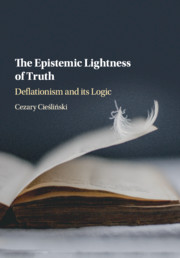Part II - Conservativity
Published online by Cambridge University Press: 30 November 2017
Summary
The central notion to be discussed in the chapters to follow is that of a conservative extension. In the contemporary literature, conservativity is sometimes presented either as an explication of the lightness of truth or at least as a demand which deflationary truth theories must satisfy. This introductory section describes the philosophical intuitions behind such claims. It contains also the plan of Part II.
To my knowledge, in the context of a discussion about the light notion of truth, conservativity was introduced for the first time by Leon Horsten, who made the following comment about Horwich's ‘minimal’ (disquotational) theory of truth:
The minimalist theory entails that a truth predicate should be conservative over a given theory that is stated without the truth predicate (or any other semantical notions). (Horsten 1995, p. 183)
Horsten's stated motivation for ascribing to the deflationists (and to Horwich in particular) the commitment to conservativity was his incapacity otherwise to see “what the neutrality of the notion of truth according to deflationism amounts to”. Since then, many authors have treated conservativeness as at least a promising explication of the ‘lightness’ of the notion of truth, typically repeating Horsten's question: how otherwise could the deflationist claim that the notion of truth is contentless or ‘metaphysically thin’?
Definition 1.3.1 characterised two notions of conservativity, which could be proposed as tools for the deflationist to explicate his position. As we saw, one notion is syntactic; the intended meaning is that a conservative extension does not prove new theorems of the base language. The second is semantic and concerns the possibility of expanding models: every model of a base theory can be expanded to a model of its conservative extension in the semantic sense.
Both notions were invoked by Shapiro (1998), who also attributed conservativity constraint to deflationary truth theories. On the face of it, Shapiro's motivation for accepting the conservativeness demand was quite similar to that of Horsten.
- Type
- Chapter
- Information
- The Epistemic Lightness of TruthDeflationism and its Logic, pp. 83 - 89Publisher: Cambridge University PressPrint publication year: 2017



